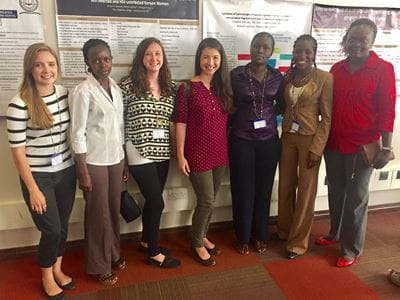As an assistant professor of pediatrics at IU School of Medicine, Megan McHenry, MD, already had a life full of children. Last fall, it quickly went from being full to overflowing.
In September, McHenry welcomed twins who made her the mother to four children under age four. Two weeks later, she received a K23 research award from the National Institutes of Health (NIH) to significantly expand her pediatric neurodevelopmental research in Kenya.
Many people would be exhausted just reading those two sentences together, but McHenry was thrilled to learn of her research award while still adjusting to her two new family members. “Part of me wanted to jump to the computer to get started, but I really wanted to enjoy the early days with the babies,” McHenry said.
McHenry’s research will instead commence later this year and will be conducted as part of IU’s participation in the Academic Model Providing Access to Healthcare (AMPATH) partnership in Kenya.
The aim of the research is to identify appropriate brain development screening instruments for use in HIV-exposed Kenyan children. The next step is to pilot an integrated screening program within the existing Kenyan care system. Children born to HIV-infected mothers are more likely to have neurodevelopmental delays than HIV-unexposed children. In sub-Saharan Africa more than one million children are born to HIV-infected mothers annually, but early identification and referral to intervention are not routinely provided.
“I hope to improve the lives of young children through my research by increasing their chance to meet their full developmental potential,” said McHenry. “This doesn’t just impact them, but it also impacts their families and their communities. If each young child can reach his or her full developmental potential, then we’ll be taking a big step in creating a more equitable world,” she continued.
The initial year of the study will include developmental tests on 240 children aged 18-36 months to determine which assessments would be most practical and accurate for use in Kenyan clinics. McHenry and her research team will also be reaching out to village elders, clinic workers, government officials and parents to convey the benefits of promoting and assessing child development within their communities. In the following years, a developmental screening program will be piloted within one of the maternal child health clinics at Moi Teaching and Referral Hospital. The goal is to implement a screening program that is effective and not too burdensome for the already busy clinical staff.
McHenry (top photo center) and her research colleagues present their research at a recent conference. In addition to her work as a physician and researcher, McHenry is also mom to four children under four years old.
McHenry’s passion for research developed as a 4th year IU medical student on a clinical rotation with AMPATH in Kenya. AMPATH is a partnership between Moi University, Moi Teaching and Referral Hospital, a consortium of North American universities led by Indiana University, and the Kenyan Government. IU School of Medicine students and IU medical residents have the opportunity to travel to Kenya to participate in medical education opportunities as part of their education and training.
Like many medical students, McHenry was unsure of her specific area of interest but thought her work would be clinical. A meeting with AMPATH’s Director of Research, Rachel Vreeman, MD, MS, changed her direction. “Rachel allowed me to help on a few of her ongoing studies in Kenya, and as I progressed through my pediatric residency and chief year, I slowly discovered the topic that I felt most passionate about—early childhood development in vulnerable populations,” said McHenry. “I have been able to learn so much about this topic during my training and fellowship and am developing the skills I need to potentially make a difference in young Kenyan children’s lives,” she continued.
Working with Vreeman and the AMPATH research network in Kenya has allowed McHenry to learn not just about research, but about the systems, environments and culture surrounding research in Indiana, Kenya, and beyond. She is grateful for all of the people that she has met through her work. “I feel like people who work within the AMPATH consortium have a special spirit within them, and I am in awe of what they all are able to accomplish. Dr. Eren Oyungu is my Kenya collaborator and I am so grateful for his insights on child development, the generosity of his time and expertise and the amazing clinical care he provides. Our research team members in Kenya, Ananda Roselyne Ombitsa, Beatrice Kaniaru, and Cleophas Cherop, are phenomenal. They are all so thoughtful and motivated in the work we’re doing to help improve child development, and I am grateful for their passion. I have met so many fascinating individuals, both from Kenya and North America, working within the hospitals and at IU House,” said McHenry. IU House is a group of homes and facilities in Eldoret, Kenya that host faculty, residents, students and other visitors from the AMPATH consortium members.
In addition to her roles as researcher, faculty member and mom, McHenry is the director of pediatric resident global health education for the division of pediatric infectious diseases and global health in IU School of Medicine. The former collegiate track and cross country athlete also still enjoys running in her spare time to relieve stress. She has a goal to run the Monumental marathon this year and completed both the Boston and Big Sur marathons while in medical school.
While she admits that these days her running may be a little slower, it’s clear that nothing else in McHenry’s life is slowing down and she wouldn’t have it any other way. “I worked hard to earn this award, and I am so grateful for the opportunity to do this work and receive training to advance skills in neurodevelopment and implementation science,” she concluded.
